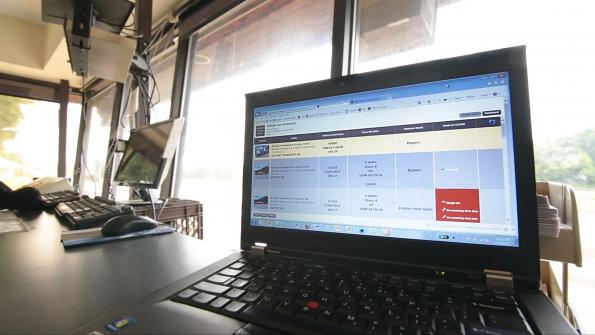Mobile-based vehicle inspection site bypass can help reduce congestion, improve safety (with related video)
Anytime commercial vehicle inspection officers can reduce the amount of time trucks spend at weigh stations, not only does it benefit the flow of commerce, but it also provides inspectors more time to inspect vehicles that need the additional scrutiny, according to Drivewyze CEO Brian Heath.
But as with many government agencies, resources for commercial vehicle enforcement are stretched thin by ever-growing demands for public services.
“The mission of commercial vehicle inspectors to assure that commercial vehicles are operated as safely as possible will only get more difficult,” he added. “Federal regulators anticipate that the freight volume handled by trucks will increase 60 percent by 2040, yet there are only 13,000 inspectors certified by the Commercial Vehicle Safety Alliance to conduct vehicle inspections. State and local agencies simply do not have the resources to stop and inspect every truck.” 
At a June 17 demonstration of the Drivewyze technology at the West Friendship Weigh Station, Capt. Norman “Bill” Dofflemyer (in photo at right), commander of the Maryland State Police Commercial Vehicle Enforcement Division, said mobile-based vehicle inspection bypass like that offered by Drivewyze can help bridge the gap between dwindling resources and growing needs. It does this by helping inspectors concentrate on those carriers and vehicles that require the additional scrutiny, he said.
Since Drivewyze uses Commercial Mobile Radio Service (CMRS) transponder technology, not traditional Dedicated Short Range Communication (DSRC), public agencies don’t have to invest in expensive in-ground infrastructure including poles and radio transceivers. CMRS transponder technology leverages the $365 billion dollar infrastructure investment wireless cellular carriers have made in providing data coverage.
Dofflemyer said CMRS transponder technology can reduce congestion on the off-ramps to weigh stations. It also allows vehicle inspection officers to concentrate their attention on trucks and carriers that need further scrutiny.
“Mobile-based bypass allows qualified carriers whose safety records meet our state requirements to stay in the flow of traffic,” he said. “It gives us the time to look more closely at carriers and trucks with borderline or poor safety records. We are also working together with neighboring states along the I-95 corridor to develop regional criteria to qualify carriers for mobile-based bypass. This will allow our state requirements to more closely align with those of other states and provide more uniformity.”
A new white paper available from Drivewyze details challenges that are impacting efforts by the Federal Motor Carrier Safety Administration and state enforcement agencies to improve highway safety. The white paper explains how CMRS technology offers a breakthrough in the capabilities of agencies to improve their roadside safety program and to reward industry compliance efforts. The white paper is available by visiting this Drivewyze website. Drivewyze has U.S. offices in Burlingame, Calif.
In this video, view a demonstration of the Drivewyze bypass service, as well as a demonstration of tangible e-Inspection capabilities.



















